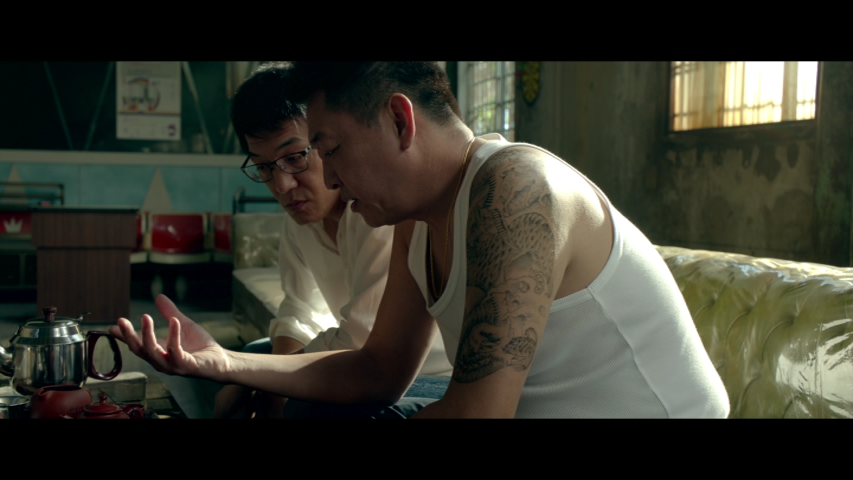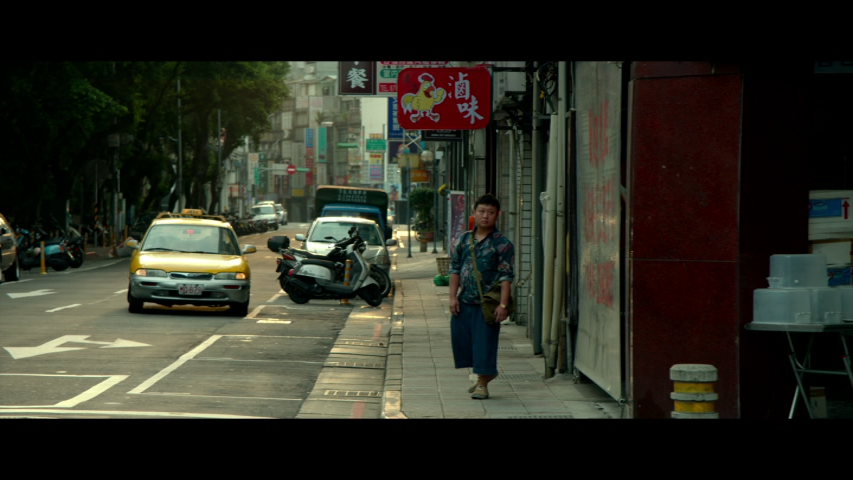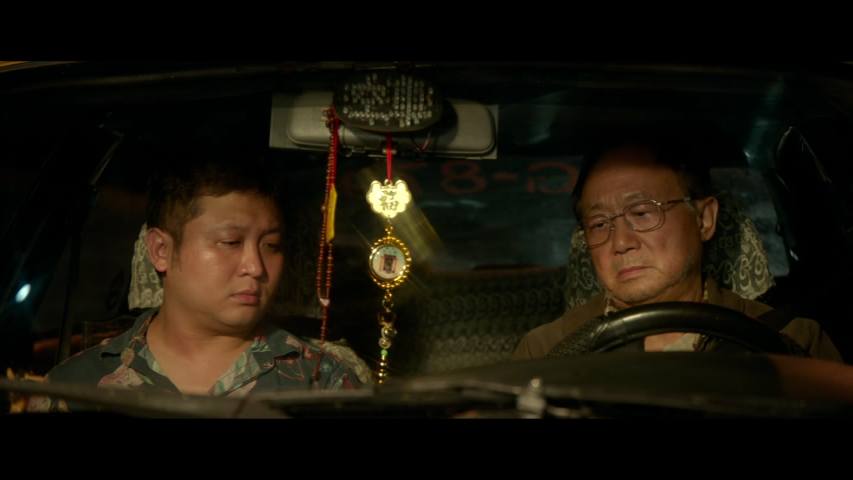Godspeed begins with an expletive, voiced feelingly by a panicked man, his face bathed in red light. The choice of words is understandable: with a pair of shears being closed around his neck and a menacing crowd of heavies standing by, Da Bao is having a day he would rather forget.

A crime drama with a nasty edge, Godspeed takes on gritty genre conventions and unexpectedly turns them into a meditation on getting older, on life’s narrowing pathways, and on unplanned friendships along the way, making for a surprisingly sweet and darkly comic tale.
The aforementioned shears (and accompanying heavies) come courtesy of an intimidating Thai crime boss, Sha di, who has grown suspicious of his protege. Fortunately for Da Bao’s neck, he makes it out alive; the scene is relayed in flashback as he tells the tale to his old friend and partner-in-crime Tuo Ge back at base in Taipei.
It is at this point that the film takes the first of many tonal shifts, as the conversation swerves onto the subject of Tuo Ge’s old sofa and, more specifically, his refusal to remove the plastic wrapping in a bid to keep it pristine. But, says, Da Bao, you can’t just preserve things forever. Sometimes, you just have to accept that things will get old and worn and enjoy the use of them in the moment. If a disproportionate amount of time seems to be spent on this point, and the subsequent unwrapping under Da Bao’s watchful eye, it’s because the shrink-wrapped sofa turns out to be a metaphor for what the film as a whole is trying to say. (On a personal side note: as a newly arrived exchange student in Taipei, I rented a room from a family and remember being intrigued by the fact that the TV remote control was kept similarly pristine inside its plastic wrapping. Whether the film is poking fun at a more general quirk of Taiwanese culture, more knowledgeable heads will have to say.)

Another scene, another shift of gears. A young hoodlum attempts to steal a moped before being chased away. Later, he sees an advert in a newspaper for a delivery driver and dials the number. The mysterious voice on the other end of the line (none other than our friend Da Bao), gives him a set of mysterious directives, inducting him into the world of organised crime. It’s another interesting take on the genre: conventionally, you might expect Na Dow to be introduced from the start, with the disembodied voice an unknown entity. The earlier introduction of Da Bao as both victim and comrade lends a more balanced dual perspective to the story when we meet him again as an unassailable voice of authority.
Now initiated and decked in new threads, Na Dow is preparing to travel south for his first drugs run, when he encounters the unwanted attentions of a cab driver, Lao Xu, whose dilapidated taxi he is keen to avoid. Xu is nothing if not persistent, and gradually Na Dow is persuaded to hire him as driver for the trip down south at an inflated rate. And so the stage is set for the third strand of the narrative – the buddy movie / road trip. Xu is a cab driver in the old school mode. Phlegmatic, friendly and opportunistic in equal measure, Xu seems to be treating the long trip a much as a vacation as a chance for some ready cash. His unflappable persona only thinly veils a man who is profoundly dissatisfied with the turns his life has taken, and his captive audience in the backseat is the unwilling participant in his angst.
there is no better joke than the laugh that breaks the tension
Godspeed is a film that is difficult to keep tabs on and the intertwined but tonally different storylines have a destabilising effect on the viewer. When the stories inevitably converge, the levity and the darkness should clash, but somehow it all holds together and gives rise to some of the best comedic moments on the part of Xu and Na Dow. As dramatists have known through the centuries, there is no better joke than the laugh that breaks the tension. Part of the reason the whole thing works is the excellent pairing and hugely enjoyable performances of Xu and Na Dow. In the great buddy movie tradition, the garrulous taxi driver and laconic gangster-in-training are perfect foils for each other and the tensions never seem forced or overblown. This is also down to a light-touch script that gives the actors room to breathe; so much of the fun is watching both characters choose silence over venting their emotions. Moments of rapprochement feel entirely earned.

The film as a whole feels as messy as life is, and this is not to condemn it. The story arcs that are only ever partially resolved, the unanswered questions, the simultaneous existence of hope and despair, loyalty and betrayal, light and shade, create a complex, multi-perspective take on life that feels far more nuanced than a film about drug runs and drilling into people’s skulls has any right to be. There’s a fatalistic air to the whole story, which befits the world of crime and poverty it inhabits. But whether ripping the plastic wrap off a sofa to enjoy a good sit down, or treating yourself to hot bowl of dumplings just because you want them, Godspeed is also a call to savour the small certain pleasures of life.
Original title:一路順風
Director: Chung Mong-hong
Year of release: 2016
Leave a Reply